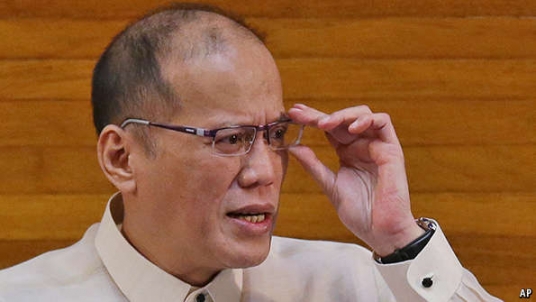Asia
Politics in the Philippines
Life after Noynoy
The president looks back; the rest of the country thinks about his successor
| MANILA

IT WAS a litany of gratitude to put an Oscar-winner to shame. In his last state-of-the-nation address to the Philippine Congress on July 27th, President Benigno “Noynoy” Aquino thanked God, his late parents and political allies, along with his social secretary, hairdresser and clothes stylist. “We are”, he added, “only in the first chapter of the great story of the Filipino people.”
Yet the curtain is coming down on Mr Aquino’s presidency. He has less than a year left in office, thanks to a single six-year term limit for the presidency. As he looked back in his address on his achievements, others are looking ahead to who will replace him.
Advertisement
Mr Aquino ran for office on the slogan “If there’s no corruption, there’s no poverty”. In office he has portrayed himself as an advocate of clean and transparent government. He has done some commendable things, including creating a commission to oversee spending by government-owned companies, publishing more budgetary information online and cleaning up government departments. Yet a recent opinion poll suggested that 46% of Filipinos believe Mr Aquino has failed to curb corruption, while just 13% say he has succeeded.
Poverty, meanwhile, has remained stubbornly high, despite fizzing economic growth. Official figures say that 25.8% of Filipinos were living below the poverty line in the first half of 2014, just 0.5 percentage points less than in 2009, the year before Mr Aquino took office. In the meantime foreign direct investment has tripled, while GDP growth has averaged over 6% a year.
Mr Aquino has made some commendable investments. He has more than doubled the share of GDP spent on infrastructure. He has also extended free schooling by two years, up to the age of 18. But the full benefits from these policies will take years to be felt. Meanwhile, the Philippines’ fast growth is slowing, as in much of South-East Asia.
Mr Aquino’s legacy will depend on how durable his reforms prove; the next president may try to undo his work. As it is, his chief domestic accomplishment—forging peace with Muslim rebels in Mindanao in March 2014—has hit difficulties over disarming the rebels. As for politics, patronage and popularity have always counted for more than policies or political parties. If Mr Aquino wants to be sure to safeguard his legacy, he must back the presidential winner.
Yet it is far from clear who that will be. Jejomar Binay, Mr Aquino’s vice-president, has declared his candidacy. He will have strong backing from the country’s powerful mayors, but has been dogged by corruption allegations. In a poll of possible candidates released in July, Grace Poe, a senator and adopted daughter of a late film-star-turned-politician, proved most popular. She acquitted herself well in hearings into a bungled anti-terror raid in the province of Maguindanao in January, in which 44 members of the special forces were killed.
The president himself is thought to be ready to endorse Mar Roxas, the interior secretary. That may be in gratitude to Mr Roxas for not challenging Mr Aquino in 2010. But the minister is gaffe-prone and lacks popular appeal. Mr Aquino reportedly wants Ms Poe to be Mr Roxas’s vice-president, but she presumably has higher ambitions.
Whatever Mr Aquino’s endorsement, it will not be full-throated. He has been a careful president, and may prove a careful lame duck. It pays always to be friendly with the person in the presidential palace: the two presidents before Mr Aquino were both jailed by their successors.
No comments:
Post a Comment